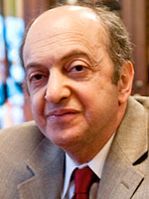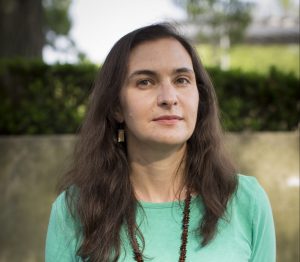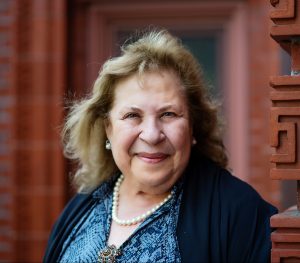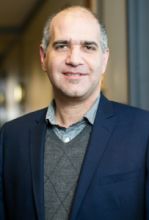Fares Center Academic Committee
The activities of the Fares Center benefit greatly from the advice and support of the Academic Committee. The Center draws on regional experts from within The Fletcher School and the broader Tufts University community. These experts span a breadth of disciplines and specialties that embody the interdisciplinary spirit at The Fletcher School and within the work of The Fletcher School.
Amahl Bishara
Associate Professor, Anthropology; Chair, Anthropology; Associate Professor, Studies in Race, Colonialism, and Diaspora
Amahl Bishara is Associate Professor and Chair of the Anthropology Department at Tufts University. She is the author of Crossing a Line: Laws, Violence, & Roadblocks to Palestinian Political Expression (Stanford 2022), about different conditions of expression for and exchange between Palestinian citizens of Israel and Palestinians in the West Bank, and Back Stories: U.S. News and Palestinian Politics (Stanford University Press 2013), an ethnography of the production of U.S. news during the second Palestinian intifada. She also writes about popular refugee politics in the West Bank, attending to struggles over and through media, water, space, and protest. Working with youth at the Lajee Center, in Aida Refugee Camp, Bethlehem, she has co-produced two bilingual children’s books. She is co-director of the award-winning documentary “Take My Pictures For Me” (2016, with Mohammad Al-Azza). She is on the editorial boards of Journal of Palestine Studies and Cultural Anthropology and is the president elect of the Middle East Section of the American Anthropological Association.
Executive Director, World Peace Foundation and Research Professor
Alex de Waal is the Executive Director of the World Peace Foundation. Considered one of the foremost experts on Sudan and the Horn of Africa, his scholarly work and practice has also probed humanitarian crisis and response, human rights, HIV/AIDS and governance in Africa, and conflict and peace-building. His latest book is Mass Starvation: The History and Future of Famine (Polity Press 2017). He is also he author of The Real Politics of the Horn of Africa (Polity Press, 2015), a full list of his publications is available below. Following a fellowship with the Global Equity Initiative at Harvard (2004-06), he worked with the Social Science Research Council as Director of the program on HIV/AIDS and Social Transformation, and led projects on conflict and humanitarian crises in Africa (2006-09). During 2005-06, de Waal was seconded to the African Union mediation team for Darfur and from 2009-11 served as senior adviser to the African Union High-Level Implementation Panel for Sudan, where he took on a number of roles in the negotiations leading to the independence of South Sudan. He was on the list of Foreign Policy’s 100 most influential public intellectuals in 2008 and Atlantic Monthly’s 27 “brave thinkers” in 2009.
Prof. Alex de Waal regularly teaches a course on Conflict in Africa at the Fletcher School, Tufts University. During this course, students should gain a deeper understanding of the nature of contemporary violent conflict in Africa. Students will be expected to master the key theoretical approaches to violence in Africa, and to become familiar with a number of important case studies. The focus is on the origins and nature of violence as well as policy responses and solutions. The course is inter-disciplinary and involves readings in political science, international relations, and social anthropology, while also touching on economics, environmental studies, and history.
Professor, History; Edward Keller Professor of North Africa and the Middle East, History
Having been educated at the American University in Cairo and the University of Oxford, and having earlier taught at Princeton, NYU, Columbia, Harvard and Cambridge Universities, Professor Fahmy is a historian of the modern Middle East with special emphasis on nineteenth-century Egypt. His books and articles deal with the history of the Egyptian army in the first half of the nineteenth century, and the history of medicine, law and urban planning in 19th- and 20th-century Egypt. Through working on such topics as conscription, vaccination, quarantines, forensic medicine and legal torture, he charts the specific ways in which a modern state was established in Egypt and the manner in which Egyptians accommodated, subverted or resisted the institutions of this modern state. In addition to his academic publications which have appeared in both English and Arabic, he is also active on regular and social media (Facebook, Twitter, YouTube, Clubhouse as well as his own bi-lingual blog: www.khaledfahmy.org). Over the past few years, he has been using his social media platforms to share ideas about his new academic project: a military, social and cultural history of the 1967 Arab-Israeli conflict. You can watch his 12-part video about the war here (in Arabic): shorturl.at/HKX16
Tamirace Fakhoury
Associate Professor of International Politics and Conflict
Tamirace Fakhoury is Associate Professor of International Politics and Conflict at the Fletcher School. Her research explores the politics of power-sharing as a central framework for conflict resolution after war. Her work also engages with the politics of refuge and migration in complex conflict environments. She also studies the role of multilateral actors—such as the European Union and the United Nations—in shaping global responses to conflict, cooperation and responsibility-sharing amid protracted conflicts.
Before joining Fletcher, she was Associate Professor of Political Science at Aalborg University in its Copenhagen Campus (Denmark), and a visiting Professor as well as the Kuwait Chair at Sciences Po in Paris (2020-2022). Prior to this, Tamirace was Associate Professor of Political Science and International Affairs at the Lebanese American University in Beirut, and the Director of the Institute for Social Justice and Conflict Resolution (ISJCR). Her work has been published in Ethnopolitics, The international Journal of Middle East Studies, International Studies Quarterly, Geopolitics, the Journal of Ethnic and Migration Studies, Migration Studies, Third World Quarterly, Current History among others. She is the author of Power-Sharing and Democracy in Stormy Weather (Springer, 2009) and the co-author of Resisting Sectarianism: Queer Activism in Post-war Lebanon (Zed Books, 2022). She is the co-editor of the anthology on Refugee Governance in the Arab World: The International Refugee Regime and Global Politics (I.B. Tauris/Bloomsbury Academic in collaboration with Sciences Po, 2025).
Leila Fawaz
Issam M. Fares Chair in Lebanese and Eastern Mediterranean Studies, The Fletcher School; Professor, The Fletcher School; Professor, History
Professor Leila Fawaz is the Issam M. Fares Professor of Lebanese and Eastern Mediterranean Studies. Born in Sudan and raised in Lebanon, Professor Fawaz received a B.A. and M.A. in History from the American University of Beirut and an M.A. and Ph.D. in History from Harvard University. She joined the Tufts faculty in 1979 as an Assistant Professor and was promoted to the rank of Professor in 1994. She served as Chair of the History Department from 1994 to 1996, Dean of the College of Liberal Arts and Jackson College, and Associate Dean of the Faculty between 1996 and 2001. She was the Founding Director of the Fares Center for Eastern Mediterranean Studies at Tufts University between 2001 and 2012. She holds a dual appointment as Professor of Diplomacy at The Fletcher School and Professor of History at Tufts University. In 2020, Harvard University awarded Professor Fawaz with the Harvard Medal. In 2014 she received the Harvard Alumni Association’s Lifetime Achievement Award. In 2012, Professor Fawaz was named a Chevalier in the French National Order of the Legion of Honor, France’s highest award, given by decree of the president of France. She served on the Governing Boards of Harvard University as an Overseer between 1996 and 2012 and was elected to serve as President of the Overseers for 2011-12. A Carnegie Scholar (2008-10), she is a member of the Council on Foreign Relations and a member of the Comité Scientifique of the Maison Méditerranéenne des Sciences de l’Homme at the Université d’Aix-Marseille in France. She served on several committees for the European Science Foundation in Strasbourg, France as well as on committees of the Social Science Research Council, the Steering Committee of the European Science Foundation, and as a delegate to the American Council of Learned Societies.
Professor of Political Science, Tufts University
Professor Malik Mufti teaches courses on international relations as well as the politics of the Middle East. He received a Ph.D. and an M. A. from Harvard University, an M.A. from Yale University and a B.A. from Middlebury College. He is the author of Sovereign Creations: Pan-Arabism and Political Order in Syria and Iraq (1996), and Daring and Caution in Turkish Strategic Culture: Republic at Sea (2009). He has also written shorter pieces on the domestic politics, international relations, and political thought of the Near East, including his latest journal articles “The AK Party’s Islamic Realist Political Vision: Theory and Practice” (Politics and Governance, October 2014); “Democratizing Potential of the ‘Arab Spring’: Some Early Observations” (Government and Opposition, July 2015); and “Neo-Ottomanists and Neoconservatives: A Strange Alignment in the 1990s” (Insight Turkey, Winter 2016). He is currently working on a research project on realism in Islamic political thought. He is a recipient of the Lillian and Joseph Leibner Award for Distinguished Teaching and Advising.
Chidi Anselm Odinkalu
Professor of Practice in International Human Rights Law
Chidi Anselm Odinkalu is Professor of Practice in international human rights law at the Fletcher School of Law and Diplomacy at Tufts University. He currently also chairs the Governing Council of the Chukwuemeka Odumegwu-Ojukwu University, a public university south-east Nigeria.
Odinkalu previously led Nigeria’s National Human Rights Commission and, for three years until the beginning of 2025, chaired the Truth, Justice and Peace Commission, a sub-national transitional justice initiative established to address the crises of violence and agitation in the states of south-east Nigeria. In 2017, he served on the panel of eminent persons that negotiated the return of The Gambia to the Commonwealth in 2017. Odinkalu has acted as counsel in international human rights litigation before Africa’s regional human rights courts and tribunals and was involved in the creation of the African Court on Human and Peoples’ Rights. He is associated with several advocacy initiatives for the protection of human rights. Among other roles, Odinkalu currently chairs the Board of Trustees of the International Refugee Rights Initiative as well as the governing board of Global Rights (Partners for Justice). Odinkalu received his Ph.D in law from the London School of Economics and Political Science (LSE). His research focuses on the contemporary challenges of multilateralism in regional systems in development, human rights and governance. He is the co-author of Too Good to Die: Third Term and the Myth of the Indispensable Man in Africa, (Kachifo, 2018). His latest book is The Selectorate: When Judges Topple the People, (Narrative Landscape, 2025).
Professor of Comparative Literature, Tufts University
In addition to his position as Professor of Comparative Literature, Professor Rastegar is the former Director for the Center for Humanities at Tufts, as well as Director of Tufts’ Arabic Program. His research encompasses two areas relating to the study of modern Arabic and Persian literatures and cultures. First, he studies Persian and Arabic literary history in the late nineteenth and early twentieth century, with a focus on movements of cultural revival or innovation. Professor Rastegar’s first book, “Literary Modernity between Europe and the Middle East”, explored the origins of the conception of literary modernity in Arabic and Persian literatures, a topic that he has further addressed in articles and as editor of a special issue of the journal Middle Eastern Literatures. Second, Professor Rastegar researches the role of cinema and visual culture in the formation of cultural memory in conflict and post-conflict social settings. This research is reflected in his second book, “Surviving Images: Cinema, War and Cultural Memory in the Middle East”.
 Ibrahim Warde
Ibrahim Warde
Adjunct Professor of International Business, The Fletcher School
Professor Ibrahim Warde is an adjunct professor of international business at The Fletcher School. His books include The Price of Fear: The Truth Behind the Financial War on Terror, which has been translated into French, Italian, Japanese, and Czech, and was selected by Foreign Affairs as one of the best books of the year about economic, social, and environmental issues, and Islamic Finance in the Global Economy, now in its second edition. He has previously taught at the University of California, Berkeley, at MIT’s Sloan School of Management, and at other universities in the United States and abroad. He was a Carnegie scholar focusing on informal finance in the Islamic World. He is also a writer for Le Monde Diplomatique and a consultant.
He holds a B.A. from Université Saint Joseph in Beirut, Lebanon, an MBA. from France’s Ecole des Hautes Etudes Commerciales, and an M.A. and a Ph.D. in Political Science from the University of California, Berkeley.








